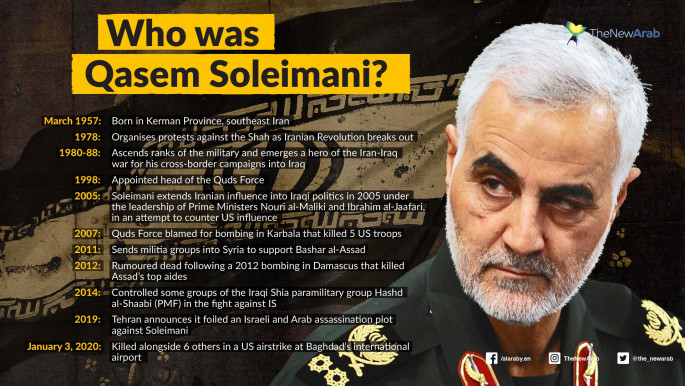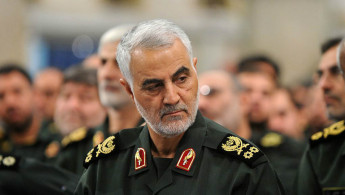Iran's slain general 'planned to attack US forces in Iraq': sources
Just a few hours later, Iran's Revolutionary Guard Corps announced its chief General Qasem Soleimani "was martyred in an attack by America on Baghdad airport this morning".
The Hashd confirmed both Soleimani and its deputy chief Abu Mahdi al-Muhandis were killed in what it said was a "US strike that targeted their car on the Baghdad International Airport road".
Shortly after the attack, the Pentagon said US President Donald Trump had ordered Soleimani's "killing" after a pro-Iran mob this week laid siege to the US embassy in the Iraqi capital.
But a new Reuters report published on Saturday revealed details of Soleimani's activities in the months leading up to his death, most of which included plans to target US interests in Iraq.
The report cited two militia commanders and two security sources that were briefed on a strategy session held by Soleimani, in which he brought together Iraqi militia allies at a villa on the banks of the Tigris River, overlooking the US embassy complex across the water.
During the meeting, which was held while mass protests rocked Baghdad and much of the Shia-majority south, the Iranian commander allegedly ordered his Iraqi ally al-Muhandis to increase attacks on US targets using weaponry provided by Iran.
Soleimani instructed the creation of a new and unknown militia group which would launch rocket attacks on Americans housed at Iraqi military bases, in a bid to stay away from the US' radar, the report alleges.
He ordered Kataib Hezbollah - a force founded by al-Muhandis and trained in Iran - to direct the new plan, Reuters reported, according to the militia sources briefed on the meetings.
Such a group "would be difficult to detect by the Americans", one of the militia sources told Reuters.
The sources also said Iran had supplied Kataib Hezbollah with drones that were capable of eluding the radar system to map out locations of US troops across the country.
Mystery attacks have targeted Iraqi military bases hosting US troops in recent months, with the most recent of which reported in November when at least 17 rockets struck a military base north of the Iraqi capital.
The government sources claimed the planned attacks were designed to provoke a US military response on Iraq that would redirect increasing protester anger on Iran’s continued meddling in the country to the US, instead.
 |
Weeks later, the US embassy in Baghdad was stormed by the country's pro-Iran camp and, as Soleimani wanted, provoked Washington to launch an air strike which in fact ironically killed the Iranian commander himself.
The report revealed the slain commander had also ordered the delivery of Katyusha rockets and shoulder-fired missiles that could bring down helicopters from Iran to neighbouring Iraq just weeks before the October meeting in the villa.
Twitter Post
|
On Friday, White House national security adviser, Robert O'Brien said Soleimani had just returned from neighbouring Damascus, "where he was planning attacks on American soldiers, airmen, Marines, sailors and against our diplomats".
It follows similar sentiments shared by other senior US officials, including Secretary of State Mike Pompeo who said Soleimani was planning imminent action that threatened American citizens when the general was killed in a US strike.
"He was actively plotting in the region to take actions - a big action, as he described it - that would have put dozens if not hundreds of American lives at risk," Pompeo told CNN.
"We know it was imminent," Pompeo said of Soleimani's plot, without going into detail about the nature of the planned operation.
"This was an intelligence-based assessment that drove our decision-making process," Pompeo added.
Meanwhile, Israeli military and diplomatic analysts revealed Israel was notified in advance of the US plan to assassinate Iran's top military general.
"Our assessment is that the United States informed Israel about this operation in Iraq, apparently a few days ago," Barak Ravid, a journalist closely linked to Israeli security establishment told Channel 13 on Friday evening.
An Israeli army officer speaking on condition of anonymity also told the Los Angeles Times that the operation to take out Soleimani "did not come as a surprise".
Comment: Soleimani assassination spells trouble for Iraqis, Iranians and the region
Iran's supreme leader Ayatollah Ali Khamenei vowed "severe revenge" for Soleimani's killing, the biggest escalation yet in a feared proxy war between Iran and the US on Iraqi soil.
He was echoed by the leader of Hezbollah.
"Meting out the appropriate punishment to these criminal assassins... will be the responsibility and task of all resistance fighters worldwide," Hassan Nasrallah said.
"We who stayed by his side will follow in his footsteps and strive day and night to accomplish his goals," the leader of the powerful Shia militant group said.
"We will carry a flag on all battlefields and all fronts and we will step up the victories of the axis of resistance with the blessing of his pure blood," Nasrallah said.
The "axis of resistance" is a term that refers to an alliance formed by Iran, Syria and Hezbollah to fight against Israel and the Western military presence in the region.
The heavily armed Hezbollah group controls whole neighbourhoods in Beirut and most of the south of Lebanon, including the area bordering Israel.
It also has fighters deployed in Syria and Iraq who were operating under Soleimani's command.





 Follow the Middle East's top stories in English at The New Arab on Google News
Follow the Middle East's top stories in English at The New Arab on Google News


